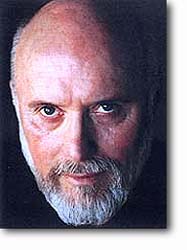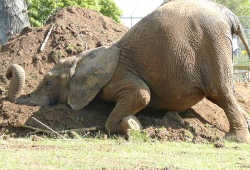Dorothy – 14/09/01
An interview with Elric Hooper – recently retired Director of the Court Theatre in Christchurch – Part 2
|
|
| Elric Hooper Photo source Elric Hooper |
Modern attitudes to theatre and drama teaching As far as drama is concerned Elric says that a huge revolution has been taking place with the growth of the performing arts departments in secondary schools, which didn’t exist when he was at school He likens drama to tea leaves. Drama must be in the water of performance for us to taste it for otherwise we are just eating dried tea leaves. Drama teaching in many cases left people with that sensation.
"The change in the attitudes towards the theatre is a very interesting psychological process," Elric said. "With the decline in formal religion and the desire for us to establish our identity and find some sort of immortality, the easiest way for us to achieve immortality is through celebrity, and the easiest way to achieve celebrity is through the performing arts. This means that there is a drive to perform for one’s society now in a way that did not exist before. In an atheistic society the only eyes that are upon a person are the eyes of other people, not the eyes of a great Being. The idea of being significant is very much allied to the idea of being seen. Since the Second World War more and more the performing arts are being seen as the quick route to immortality.
"We may be living at the end of the Renaissance", he said, "and the changes that are happening at present are just as dramatic as those from the Stone to the Iron Age."
Growth in teaching institutions Apart from the University there are nearly twenty tertiary institutions offering training for the professional work in the performing arts. One of the things that Elric is deeply concerned about is the heartbreak that goes with that for young people because unless they are very talented and very lucky most are going to fail.
Elric’s views on teaching drama In Elric’s view drama should be seen as useful in education for the encouragement of good speech and the development of physical confidence, rather than as a stepping stone towards celebrity.
Acting is a necessity in life and most of us are actors in the sense that we appear in different roles in different aspects of our lives. Because acting is walking and talking and most people can walk and talk, too many people think they can act, but Elric believes that there are very few truly talented actors. There is little recognition of the fact that acting is a skill which must be learnt. For instance when first at drama school in England Elric spent the first four or five weeks learning how to walk. Actors must learn about their own walk to be able to change it to fit the characters they are playing.
Elric took up teaching movement and the relationship between movement and the voice in theatre companies where he was working in England and in New Zealand. In his first years at the Court Theatre he took classes every Monday morning for two hours. He stopped this only when Equity said that this must count as part of the rehearsal period and the time was needed to rehearse the plays.
Maintenance of the plant He warns young actors of the difficulties ahead. "You are going to have big psychological problems being a performer. Because of the strange nature of the profession you are not going to be working all the time. There are going to be gaps when as Dustin Hoffman said when he was about to give up acting just before he got his big break, ‘How can I give up something I am not doing?’ There has to be something within you that when someone says to you, ‘What are you?’ you can reply, ‘I am an actor.’ Part of that is the maintenance of the plant so that the actors sound and look interesting. They need to look after themselves, eat properly, and pay attention to their appearance. Looking as good as possible will help to get them a job."
In teaching the young, Elric meets remarkable young people, who are often better looking and healthier and have more drive than the people he remembers of his own generation. Males have changed a lot. The healthy liberation of their narcissism he sees as an important change of attitude. When he was their age the way men smelt was something suspect. Now using after-shave and deodorant is routine. It may sound trivial but it represents a change of attitude.
"This is helpful in the theatre because unless you are narcissistic or exhibitionist there is no point in becoming involved in theatre. It’s how you challenge those two vices and transform them into artistic virtues which is really what good acting should be about," said Elric. "One reason why the English produce such good performers is that their natural reticence is like the pressure cooker lid on top of the art."
There are only three things that an actor has – the imagination, a voice and a body. They must be maintained, and the greatest of these is the imagination. Elric has to keep reminding them to read the newspaper, find out what is going on, and what is hot in the philosophical field, because it’s going to come up in a play quite soon.
Importance of broadly based study He is appalled at the level of scholarship in the theatre in this country. On two talks in the Arts Programme two people have made outrageously wrong statements about the work they are doing – facts they could have checked in a cheap encyclopaedia. "The fact that the interviewer had no idea that they were talking a load of rubbish is also terrifying," he said.
He stresses to actors that they have to know the subject because as Blake says ‘To generalise is to be an idiot.’ To know things specifically is essential because it is the specific which is exciting. All the great teachers say, ‘Be specific. Do not generalise. Play intention. Don’t play mood.’
"The number of actors who float into productions without having even read the background is lamentable," Elric said. "The age of the dumb actor has really passed. There is a scholarship in performance even in modern plays. If you are doing a play like Closer by Patrick Marber find out where the play was written, who wrote it, where it was first performed, how it was first received, and who played the initial roles, because that can often be a clue as in the big companies the author, not just the director, is often instrumental in choosing the actors in the initial production. "
Some of these problems he believes may come from provincial or colonial fear. To know something would be to daunt one. That should be overcome because time and again local actors can perform just as well as famous actors in the same role. The excitement of knowledge behind the theatre is immense and that knowledge gives confidence. Sometimes actors arrive at a rehearsal with their own lines marked on the script, but with little knowledge of what the other actors are going to say and totally unaware that in another scene where they are not on stage significant comments are made about the character they are supposed to be playing and understanding!
Since the Second World War playwrights have asked actors to do things and know things that no previous generation has done. For instance in plays about science like Copenhagen and Arcadia and Experiments with an Air Pump which is about the contrast between the seventeenth century and the modern world, the actor has to be convincing has to do more than mouth the words the author has written. There is a whole new atmosphere needing the intellectual strength of actors which unfortunately is not being sufficiently reinforced.
"The teacher must not be a guru" He is very against what he terms ‘the guru idea of theatre teaching’. He hates teachers to set up a method or say that there is only one way things can be done. He explains to his students that ultimately they are going to have to develop their own personal technique, find out the ways that activate their emotional life, and then translate it into physical action, and find the way that they learn or develop roles.
As a teacher he presents to his students a range of options as there is no single way. Anyone who tells students that there is only one way is putting them ‘into emotional corsets’ and preventing them from fulfilling themselves.
He studied in New York with Lee Strasbourg, the Method teacher, and found that some of his teaching was very interesting, but much of it was ego building. "If students at the beginning of a class act out a six minute scene and the teacher speaks about it for the next hour and a half, that it is not good teaching. It is ego-building. The actors should be doing the work, and a good director will quietly suggest a change of approach, of pace for instance, and by trying it out the actor will often find the emotional release that was needed.," he said.
Good teachers, he thinks, are people who can re-imagine ignorance, what it feels like to know nothing, the fear of knowing nothing, like not knowing which fork to use at the table. Really good teaching keeps re-inventing the way a topic is presented. If after two years teachers find they are using the same verbal formula then maybe what they are offering is drying up.
He tells students to beware of people who have a set vocabulary for explaining a topic.
Now that he has resigned from his position at Director of the Court Theatre Elric is able to choose which of his activities to continue – directing, teaching, or writing. Teaching is not always his first preference, but the moment he begins work with a group of talented young people his strong desire to see them develop their potential fires his enthusiasm.
Click here to read An Interview With Elric – Part 1 Click here to read An Interview With Elric – Part 3




